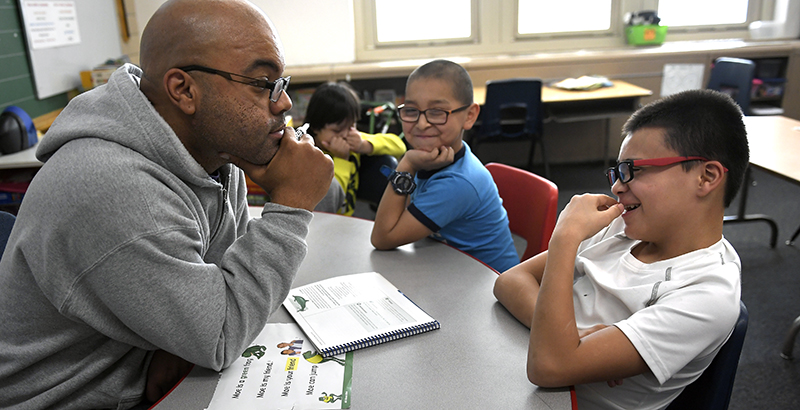Howard: Want to Create a More Diverse Teacher Workforce? Start With the Dedicated Professionals Already Working in Schools

Get stories like these delivered straight to your inbox. Sign up for The 74 Newsletter
Ten years ago, I would have never imagined becoming an educator, let alone even considered a career in education. Growing up, I had few teachers who looked like me and who shared my identity as a Black male. My school district maintained a sizable number of black educators; however, none of the Black teachers taught in the gifted program I participated in for the majority of my K-12 experience. This had a profound effect on how my peers and I internalized who could be academically successful — and who could be a highly effective educator.
Across the country, less than 20 percent of educators identify as Black, Indigenous and people of color, while nearly 50 percent of students do. This problem persists despite the fact that students of color benefit from having at least one teacher who shares their racial identity. Additionally, research confirms that educators of color in general can have a profound effect on the academic achievement of all students.
As schools across the country grapple with systemic racism, communities are turning their attention to teacher recruitment — specifically, recruiting a more racially, linguistically and ethnically diverse teacher workforce. For these efforts to be more successful, educator preparation programs need to create pathways for professionals of color already working in schools who could become excellent educators with additional support. And policymakers need to ensure that legislation enables their success.
Teacher assistants, paraprofessionals, paraeducators, student services coordinators, administrative assistants and one-to-one aides are often multilingual and racially and ethnically diverse. They often live in the communities where they work and have forged deep, trusting relationships with students. Many of them seek to grow into lead teacher roles, but they face significant barriers to obtaining their bachelor’s degree and teaching credential. While much attention is rightly dedicated to cultivating an interest in teaching among young people, and most educator preparation programs are geared toward them, there is a lack of support for returning adult learners. Some of the most promising teacher candidates, however, aren’t on a traditional pathway.
Paraprofessionals earn less than other school-based staff and commonly juggle multiple responsibilities while working full time and raising families. Going back to school to get a teaching license or college degree can be expensive and incredibly difficult, and a part-time college program could take years to complete.
Education leaders who want to bolster a more diverse teaching workforce have a few tools to better support these professionals to become teachers. They can support or create flexible educator preparation programs so paraprofessionals can take classes in the evenings or on weekends. In partnership with schools and districts, higher education institutions can design and implement programs that credit paraprofessionals for the significant, relevant work and life experience they’ve gained. For example, Equity Unbound, the program I co-launched in partnership with College Unbound, can be completed in less than three years, resulting in a bachelor’s degree. College Unbound counts past college credits and life experiences towards degree requirements.
Once engaged in an educator preparation program, paraprofessionals, like any person, can benefit from an extensive support network. Each of the participants in our program has a dedicated adviser who provides one-to-one coaching and plays multiple roles, including academic problem-solver, confidante, success coach, consultant and motivational speaker. Additionally, they meet weekly to discuss opportunities, challenges and overall progress.
State and local government leaders can also play a pivotal role in supporting access to flexible educator pathway programs. They can allocate funding for paraprofessionals to become certified teachers and support partnerships among higher education institutions, community-based organizations, and schools and districts that implement alternative preparation programs. Through a generous grant from NewSchools Venture Fund, we were able to provide the majority of our program participants with scholarships to offset the costs of attending college. We’re looking to develop partnerships with government entities in addition to foundations to ensure a sustainable cost-sharing model so participants’ finances don’t limit their participation.
One of the most restrictive barriers to teacher certification is standardized exams such as the Praxis test. A 2011 report from the Educational Testing Service, the organization that develops and administers Praxis, found racial disparities in certification test results. Too often, failure to pass this exam prevents otherwise qualified individuals of color from entering the teaching profession. In Rhode Island, we’ve developed a strong relationship and partnership with our state department of education that has featured regular strategy meetings and ongoing technical assistance. This significant vote of confidence provides an opportunity to challenge existing certification requirements that disproportionately impact prospective educators of color, such as standardized testing.
This past summer, Equity Unbound graduated its first participant who’s now a lead teacher in an early childhood education program. During her graduation speech, she told the audience: “I’m grateful for a program that supports students who have lives, who have families and who are adult learners.”
Any strategy to recruit, support and retain a more diverse teacher workforce must include school support professionals. People working in schools deserve the opportunity to move up in their careers while still holding on to their jobs. These talented professionals of color already choose to work alongside young people, but they need leaders to give them the space to unleash their potential as the next generation of inspiring educators.
Carlon Howard is the chief impact officer and co-founder of Equity Institute, overseeing organizational strategy, internal operations and implementation of the institute’s premier educator pathway program.
Disclosure: The Chan Zuckerberg Initiative, Bill & Melinda Gates Foundation, Walton Family Foundation, Overdeck Family Foundation, Carnegie Corporation of New York and Charles and Lynn Schusterman Family Philanthropies provide financial support to the Equity Institute, New Schools Venture Fund and The 74.
Get stories like these delivered straight to your inbox. Sign up for The 74 Newsletter

